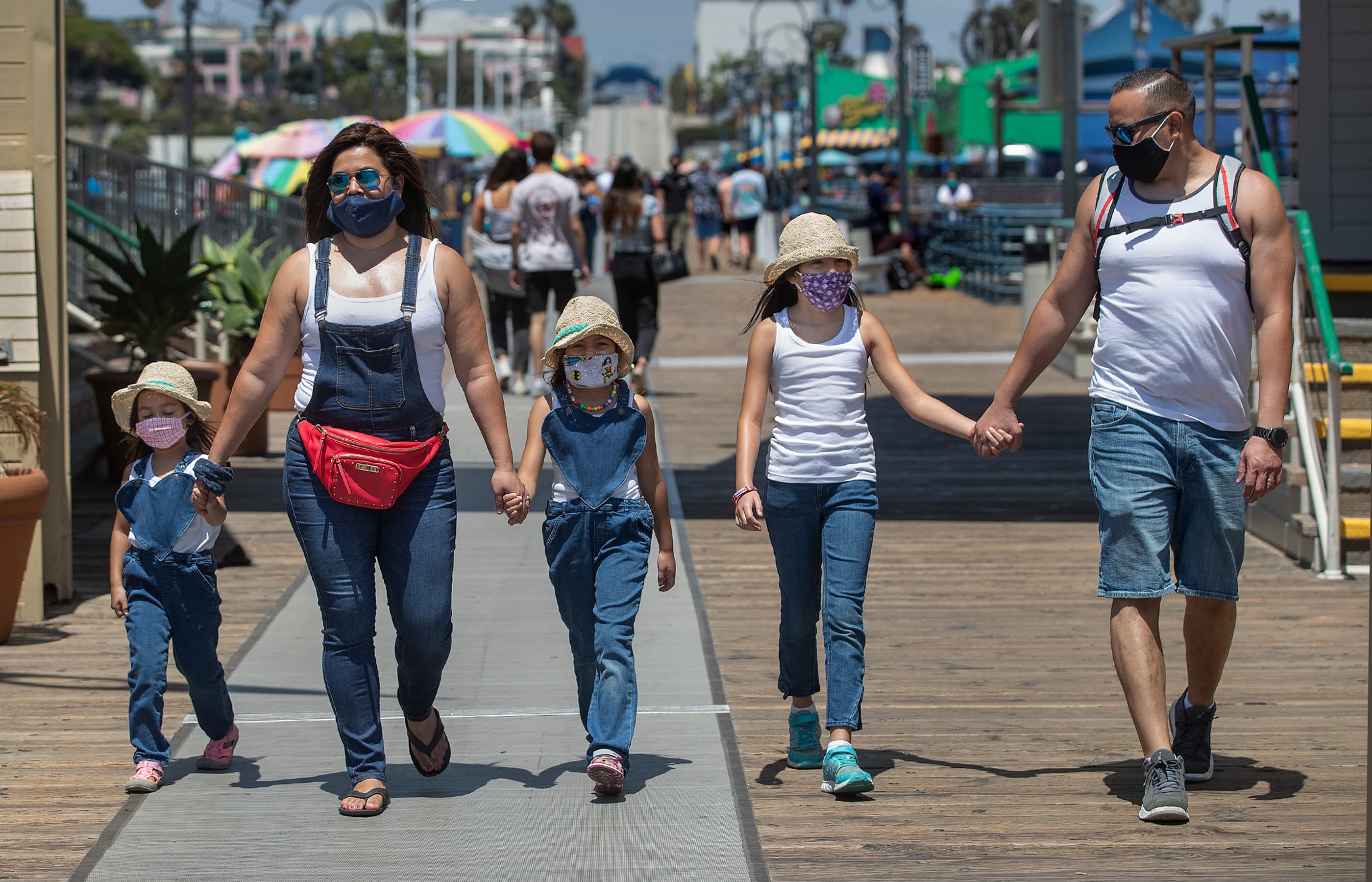A stylist wearing a protective mask cuts a customer's hair at a barbershop in Atlanta, Georgia, on Monday, April 27, 2020.
Dustin Chambers | Bloomberg via Getty Images
A federal face mask mandate would not only cut the daily growth rate of new confirmed cases of Covid-19, but could also save the U.S. economy from taking a 5% GDP hit in lieu of additional lockdowns, according to Goldman Sachs.
Jan Hatzius, Goldman's chief economist, said his team investigated the link between face masks and Covid-19 health and economic outcomes and found that facial coverings are associated with sizable and statistically significant results.
"We find that face masks are associated with significantly better coronavirus outcomes," Hatzius wrote in a note to clients. "Our baseline estimate is that a national mandate could raise the percentage of people who wear masks by 15 [percentage points] and cut the daily growth rate of confirmed cases by 1.0 [percentage point] to 0.6%."
"These calculations imply that a face mask mandate could potentially substitute for lockdowns that would otherwise subtract nearly 5% from GDP," the economist added.
He first focused on to what extent, if at all, the actual use of face masks reduces the infection rate of Covid-19 by looking at differences in population behavior by state. For example, Hatizus found only about 40% of respondents in Arizona say they "always" wear face masks in public, compared with nearly 80% in Massachusetts.
Goldman then analyzed the impact of mandates issued by 20 U.S. states plus the District of Columbia between April 8 and June 24 and compared it with actual face mask usage in public using YouGov Covid-19 respondent data.
The results are "large and highly significant" and show that state mask mandates raise the percentage of people who say they "always" or "frequently" wear masks by about 25 percentage points in the 30 days after the government order.
Meanwhile, the group of people who say they "always" wear masks jumps by 40 percentage points more than 30 days after the mandate. That result suggests the order causes people who had previously said they "frequently" wear masks to "always" wear them.
Left to right-Daniela Valenzuela, 4, her mother Lorena, 38, sister Sofia, 6, sister Camila, 9, and father, Cesar, 41, wear protective face covering against the coronavirus during a visit to the Santa Monica Pier on June 29, 2020.
Mel Melcon | Los Angeles Times | Getty Images
Critically, Hatizus said wearing face masks appears to have a causal impact on the rate of new Covid-19 infections. These findings are not weakened when controlling for fewer trips in public or avoiding large gatherings.
All told, Goldman's base case is that a national mandate to wear face masks could raise the percentage of Americans who wear masks by 15 percentage points and slash the daily growth rate of confirmed cases by 1 percentage point to 0.6%.
The investment bank then translated those results into GDP terms by asking how severe any government-imposed lockdowns would have to be to cut infections by 1 percentage point. To do this, Hatzius compared the severity of prior lockdowns in the U.S. to how the American economy has already reacted to state-imposed business closures.
By Goldman's estimates, lockdown efforts — both official government restrictions and actual social distancing — earlier this year subtracted 17% from U.S. GDP between January and April. Other countries with even more aggressive restrictions saw even larger economic effects.
Using those results and a target to reduce daily growth rate by 1 percentage point, Goldman Sachs found that a face mask mandate could potentially substitute for lockdowns that would otherwise subtract nearly 5% from GDP.
"If a face mask mandate meaningfully lowers coronavirus infections, it could be valuable not only from a public health perspective but also from an economic perspective because it could substitute for renewed lockdowns that would otherwise hit GDP," Hatzius wrote.
— CNBC's Michael Bloom contributed reporting.
Subscribe to CNBC PRO for exclusive insights and analysis, and live business day programming from around the world.


